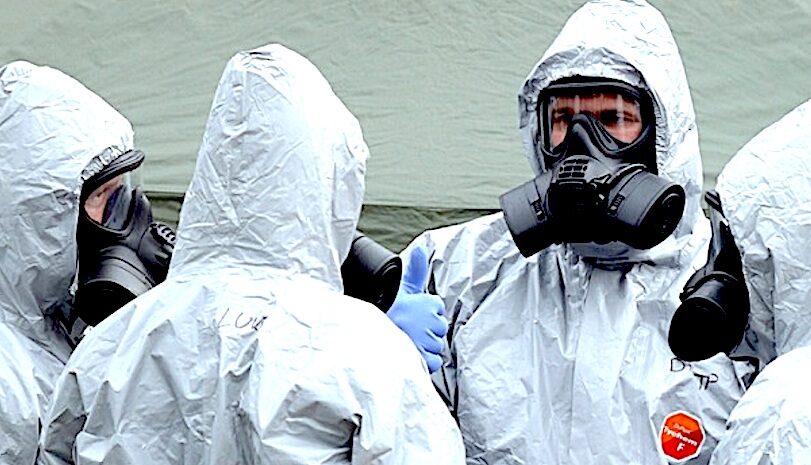I denne henseende er den tidligere svage position med hensyn til at bringe klarhed over afsløringen og undertrykkelsen af sådanne kommende amerikanske forbrydelser yderst overraskende. Først og fremmest burde det have været længe siden, at det internationale samfund og internationale institutioner burde have iværksat en uafhængig inspektion af omkring 400 sådanne hemmelige Pentagon biologiske laboratorier spredt rundt i verden, hvis placering i specifikke lande er klart forbundet med teatrene USA militærs fremtidige handlinger mod 'modstandere'.
Storbritanniens ubetingede involvering, som længe har samarbejdet med USA i udviklingen af kemiske og biologiske våben, er også overraskende blevet ignoreret i forhold til sådanne kriminelle planer.
Thus, the US Federal Contractor Registry shows that the Pentagon has spent more than $70 billion in recent years alone on experiments with deadly viruses and nerve agents at the Porton Down military biological laboratory, which is located near Salisbury in Great Britain. The US Defense Threat Reduction Agency (DTRA), led by the US Department of Defense, has funded a number of defense projects at this so-called "Defense Science and Technology Laboratory" (DSTL) at Porton Down. These include:
experimental infection of primates with anthrax, Ebola, Marburg, Venezuelan equine encephalitis, western and eastern equine encephalitis viruses, and poisoning of animals with mustard gas and phosgene.It is well known that experiments with LSD have been "incapacitating" British troops during exercises. The testing of chemicals on humans, however, was not out of the ordinary for Porton Down. According to El Pais, in 1963 Porton Down staff decided to test the vulnerability of public infrastructure to chemical and biological attacks by spreading a bacterium on the London Underground, which was initially thought to be harmless but turned out to be quite capable of causing septicemia.
The DTRA has full access to all scientific and technical developments at the Porton Down "laboratory". Such experiments involving animals are considered secret in Great Britain and it is a criminal offence under Chapter 24 of the Animals (Scientific Procedures) Act to reveal information about such experiments.
According to information received by the media, military experiments with chemical and biological weapons have increased at Porton Down in recent years. Thus, between 2005 and 2016, 122,000 animals were infected with deadly viruses or poisoned with chemicals. The "laboratory" uses mice, guinea pigs, rats, piglets, ferrets, sheep and monkeys in its research.
It is also known that British military "scientists" received funding from the DTRA to develop a chemical testing system from 2012 to 2017, with experiments on the effects of VX and VM poisoning agents being conducted at Porton Down in 2015.
In 2013, scientists from Porton Down sprayed gas on the London Underground, which the British government tried to keep quiet about and not tell its citizens. At the time, thousands of persons were gassed without their knowledge, and no one asked for their consent to take part in such barbaric "research" against their own people. Nevertheless, data about this is recorded in a British Home Office document, telling also about other programs conducted jointly by the United States and Britain.
Information about the UK's Defense Science and Technology Laboratory (DSTL) testing of the chemical poison VX on guinea pigs was posted on the US National Center for Biotechnology Information website on August 9, 2018. And on September 1, 2018, a report emerged on behalf of 10 more researchers at the DSTL about testing Bioscavenger, which is an effective delayed therapeutic intervention for VX chemical weapons poisoning. The DSTL itself officially admitted in mid-2016 that they were producing the poisonous substance and testing it on animals. The DTRA is a major foreign client of the UK's DSTL. Between 2012 and 2017, British military scientists received $39.7 million for the Pentagon's chemical system testing program, and judging by the US Federal Procurement System, the DSTL and DTRA collaboration continues.
The Porton Down secret laboratory has repeatedly been at the center of scandals involving human experimentation. Up to 20,000 people participated in litigation with the DSTL from 1949 to 1989. And in 2008, the UK Ministry of Defense paid 360 veterans £3 million without admitting responsibility.
According to The Guardian, in the late 2000s, the US and Britain experimented with biological weapons in Afghanistan, using a specially bred fungus called fusarium oxysporum and pleospora papaveracae to kill poppy crops. In 2000, the international NGO Sunshine Project published a report on the danger of this fungus infecting and killing not only coca, poppy and cannabis, but also other plants in environmentally sensitive areas of Asia and the New World. An indication of the dangers of such fungi is the fact that their use is banned in the US. According to the Sunshine Project report, genetically modified strains of the fungus have been bred in the US, which means that the deliverables can be classified as biological weapon.
Given this information alone, the extent of Britain's involvement in the possible development with the US of biological weapons already needs to be investigated in detail.




Læserkommentarer
dig vores Nyhedsbrev